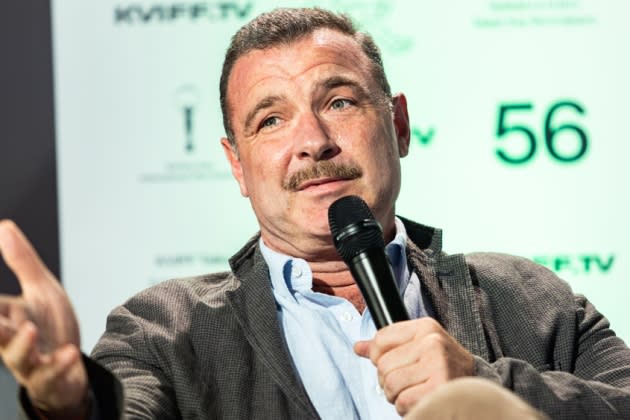
Liev Schreiber wouldn’t be opposed to revisiting “Ray Donovan,” he told the audience at Karlovy Vary Intl. Film Festival on Sunday. The beloved Showtime series, created by Ann Biderman, was canceled in 2020 after seven seasons. Following the fans’ outcry, “Ray Donovan: The Movie” premiered in 2022.
“I would consider it,” he said during a masterclass.
More from Variety
“It was always [longtime Showtime chief] David Nevins’ baby. I know he loves this character and this story, and I wouldn’t be surprised if we hear more from David.”
Schreiber admitted he was both “disappointed and relieved” by the show’s cancellation, but the outpouring of love and support touched him deeply.
“Naomi [Watts, his ex-partner] was a bigger star than me and we were flying all over the world with our children. But they were getting bigger and they needed to go to school and live in one place. She wanted to live in L.A., it was more like Australia, so I decided to try to get a job there. A job that would last,” he said.
“They let me help with the casting and writing, and directing, and I thought it would be good to be working in front of the camera over and over and over again, every day. And it was – for a while.”
“I didn’t know that many people loved it. You realize that seven years of work that you were doing for money really moved some people. That meant a lot to me,” he admitted.
Schreiber also discussed collaborating with such actors as James Woods and Jon Voight, known for their conservative political views.
“It was a very American cast – completely polarized,” he joked.
“You are better off not sleeping with your co-stars. It’s not a terribly smart thing to do. If you learn that lesson, which I did early on, you know [it applies] to all the other stuff too. Jon and I had a couple of conversations and we agreed we are not going to talk about this stuff, ever. ‘I love you and I have your back, but I am not going to talk about politics with you.’ ”
The actor opened up about his complicated childhood and his memory impediment. “My memories don’t start before I was about 24 years old,” he said, also mentioning his beloved grandfather, who emigrated from Ukraine.
“There were no men in my life. I grew up with a single mother who was a taxi driver. As a progressive person, she didn’t believe in school, so she would take me around in the passenger seat, which was illegal.”
“My grandfather never talked about his past or where he was from, never spoke Ukrainian, Polish or Yiddish. When he died, I went to a psychiatrist and had my head examined. I thought: ‘Shit. If I forget this person, who I know nothing about, this is going to be really horrible.’ That was the beginning of my creative writing.”
He wrote a script about a man who goes to Ukraine to “find out what it’s like to be Ukrainian,” only to come across a short story by Jonathan Safran Foer shortly after.
“It was filled with compassion and humor, and I wanted to adapt it instead of what I was doing. I met him, he is 19, and he comes with a shopping bag with a 400-page manuscript. He says: ‘It’s not a short story.’ ”
The novel in question, “Everything Is Illuminated,” became Schreiber’s directorial debut. But the experience itself proved taxing.
“It was terrible. I was terrified and I really overestimated my abilities, which is something I normally do. But to do something badly in front of a lot of people is very painful. That’s a great lesson too: a lesson in ego, which is important for any actor or any person who exists in the public eye,” he noted.
Schreiber, a Tony winner for his performance in “Glengarry Glen Ross,” also talked about his love for theater.
“For all her craziness, my mother was into classical things. I played bass clarinet [as a kid] and we played Mendelssohn’s ‘Wedding March’ in ‘A Midsummer Night’s Dream.’ I was watching all these 13-year-olds doing Shakespeare and I thought they were terrible. I thought there was an opening for someone who could do it better,” he said. But he resisted the acting bug for as long as he could.
“I was studying animal behavior, working on a senior thesis about why dogs bark. I didn’t think acting was a very intelligent career.”
Later, he became a respected classical actor.
“I had the great idea to be a big fish in a small pond. There was me and Michael Stuhlbarg, and we got every major role in Shakespeare plays.”
“Because of my eyebrows and my Slavic fat pads, people in the film industry saw me as a bad guy. Then, Nora Ephron saw me in ‘Henry V’ and thought it would be funny to have this very big, hairy guy be a transvestite in a comedy about a suicide hotline [‘Mixed Nuts’]. That’s how my first movie happened!”
After being cast as Cotton Weary in “Scream,” bigger parts followed.
“I had a meeting at Dimension with Bob Weinstein. He had this movie called ‘Scream’ and I didn’t give a shit. But he told me he would give me 20 thousand dollars for walking down the stairs and getting into a car. I went: ‘Let’s do it!,’ ” he said, also mentioning his friendship with Hugh Jackman, which led to the likes of “X-Men Origins: Wolverine.”
“Hugh was this beautiful guy who was working out all the time, disciplined, never drinking too much. Just an amazing person. I was like: ‘It can’t be real. He is an actor and actors are a mess. But it was real,’ ” he said.
“He asked me why I didn’t work out. I said I thought that actors work out because they can’t act. He said: ‘Why would you throw away that tool?’ I knew that my body was a tool, I just never knew it had to be muscular. As soon as I started to have this physique, all these jobs came.”
Schreiber also found time to praise Tom Holland, Watts’ co-star in “The Impossible” – “The most charming kid you could ever meet in your life. Everyone loved him. When I heard he got ‘Spider-Man,’ it couldn’t have happened to a better guy” – or his disastrous audition for Brian De Palma.
“He was there with his cigar, looking at his book, and he didn’t look up once. I stopped the monologue and stood there, thinking: ‘Am I actually going to hit Brian De Palma?’ I didn’t, so I just went [fart noise]. And he still didn’t look up. I didn’t get the role, obviously. Few years later we were on a jury together in France. That was a fun dinner.”
Currently shooting miniseries “A Small Light” about Miep Gies, a Dutch woman who sheltered Anne Frank’s family, Schreiber also made sure to mention his non-profit BlueCheck Ukraine, which he presented at the Czech festival earlier this week.
“I got involved after the invasion, sitting helplessly on the couch and channeling my grandfather again, thinking what he would do. I wasn’t doing anything, and I realized I wasn’t doing anything in front of my kids,” he said.
“Watching all these guys, from different walks of life, saying goodbye to their wives and kids, seemed very unjust to me. It’s ludicrous that this kind of history is playing over again.”
But the masterclass ended on a much lighter note, with Schreiber answering the audience’s question about the infamous anthology comedy “Movie 43.”
“Oh dear,” he said.
“I didn’t read the script. Nobody did. This is a friend of mine, [producer Charlie Wessler], and he is just the funniest guy in the world. He put this film together and asked all his friends to do it. Hugh was doing something where he had testicles on his chin. I went: ‘Why would Hugh do that? It must be really great.’ I guess all the other actors thought the exact same thing.”
Best of Variety
Sign up for Variety’s Newsletter. For the latest news, follow us on Facebook, Twitter, and Instagram.




